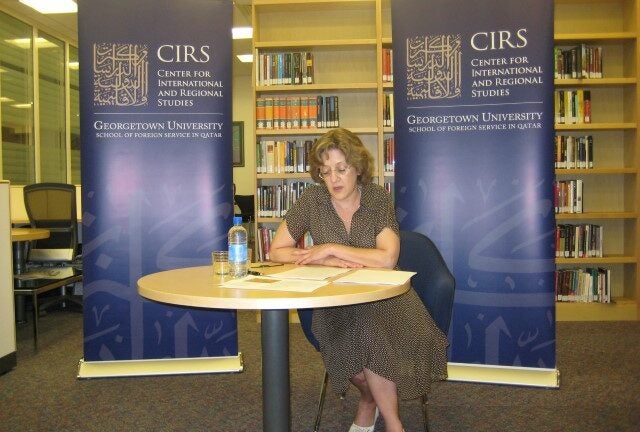Dialogue Series, Environmental Studies, Regional Studies
Victoria Pedrick on Myths of Desecration in Nature

Victoria Pedrick, Associate Dean and Associate Professor of Classics at the Georgetown University School of Foreign Service in Qatar (SFS-Qatar), wrapped up CIRS events for the academic year 2007-2008, with a lecture entitled “A Hunger for Trees: Myths of Desecration in Nature.” The lecture was addressed to an intimate audience of 40 people made up of students, Qatar Foundation faculty and personnel, locally-based ambassadors, and interested members of the general public. The talk was the sixth in the Monthly Dialogue Series, an academic and outreach effort sponsored by CIRS where faculty discuss their latest work and research interests.
Pedrick began her talk by recounting a variety of anecdotes about how the tree figures in ancient mythology and how, through these stories, it can be read as a symbol of a wider understanding of nature and human attitudes regarding their natural environment. As such, Pedrick’s lecture came with a warning regarding current ecological disasters. She cautioned that environmental degradation largely stems from how humans determine their role in the world as the center around which all other elements oscillate.
Pedrick explained that ancient Greek and Roman myths, although fictional, “offer us a window onto the ancient sensibilities and imagination of nature.” Beneath their fantastical elements, these ancient myths reveal the truth of how ancient peoples reacted towards their natural environments and how they affirmed their debt to it. She explained that by comparing these ancient stories to modern ones, we can clearly see our relative deterioration in values regarding the natural environment and how we have downgraded nature to little more than a resource that is in servitude of human endeavor and subject to the will and mercy of our voracious needs. Today’s insatiable human appetite and “hunger for trees” overrides any of nature’s delicate requirements as natural resources are exploited with impunity and humans rarely, if ever, give back in the form of sustainability and reciprocity. Today’s ecological destruction is paralleled by the myth of Erysichthon and the curse of the insatiable hunger cast on him by the goddess Demeter in return for his brazen cutting down of a sacred tree.
Roman and Greek myths offer glimpses into human relationships with nature and with trees in particular. Pedrick explained that “yet despite – or perhaps because of – its ubiquity in ancient life, the tree holds an enigmatic place in ancient thought.” Trees are the epitome of what we understand nature to be; a complex cycle that is at once annual and fleeting and yet lasting far longer than the average human life. Trees’ growth cycles from seed, to sapling, to splendid creations are in tune with seasonal cycles and if left to grow naturally in good conditions, can grow virtually eternally. Trees’ life cycles of leaf-growth, full foliage and leaf-fall are in harmony with the cycles of the seasons as these natural elements work in conjunction and in support of each other in a reciprocal manner.
In ancient Roman and Greek mythologies, trees were valued and revered because they were crucial to the survival of ancient civilizations, and also because they were the source of all kinds of benefits and comforts. Trees provided wood for a great many things but most significantly, they were needed as vital elements to sustain the lives and lifestyles of the ancient heroes. A variety of ancient myths tell of the great heroes who depended on wood to build their chariots and mighty ships. These were the vessels that carried them on the glorious journeys that secured the retelling of their stories and hence their immortality and their being eternally etched in lore. Trees also provided the wood with which to take these heroes on journeys of another kind: they were used to build the funeral pyres that carried them across into the afterlife. As such, the humble tree was seen as noble, and its simple offering of its own body as a mournful loss and a sacrifice respected by all who cut down trees. Many of the myths record that often, paradoxical prayers of thanks and prayers for forgiveness were said just before a tree was cut down in acknowledgment of the complexity of the relationship between humans and nature. Trees were simultaneously needed as a resource and yet at times needed to be cleared to make way for grazing and farming areas and all the practices that rendered humans civilized. Today, however, a tree’s use is measured by its exchange-value and has become an object of epistemological violence as it is forced to become a partisan to modern humans’ perception of nature as little more than a profitable resource.
The complexity underlying ancient stories is academic proof that humans and nature were in a delicate relationship of reciprocity. It is thus through these ancient Greek and Roman myths that modern humans can take valuable lessons and see that our progress has, in many cases, led to poverty. Our development has been dwarfed by ancient humans’ advancement in the stewardship of nature and of its bounty.
Summary prepared by Suzi Mirgani, CIRS staff member.